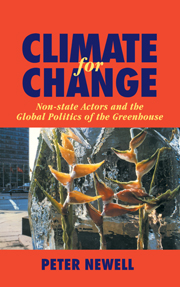Book contents
- Frontmatter
- Contents
- Acknowledgements
- 1 Politics in a warming world: introduction
- 2 Existing approaches: problems and limitations
- 3 Knowledge, frames and the scientific community
- 4 Climate of opinion: the agenda-setting role of the mass media
- 5 Climate for business: the political influence of the fossil fuel lobbies
- 6 Climate for change: environmental NGOs
- 7 Conclusion: states, NGOs and the future of global climate politics
- Appendix A List of abbreviations
- Appendix B Chronology of the international response to the issue of climate change
- References
- Index
3 - Knowledge, frames and the scientific community
Published online by Cambridge University Press: 02 December 2009
- Frontmatter
- Contents
- Acknowledgements
- 1 Politics in a warming world: introduction
- 2 Existing approaches: problems and limitations
- 3 Knowledge, frames and the scientific community
- 4 Climate of opinion: the agenda-setting role of the mass media
- 5 Climate for business: the political influence of the fossil fuel lobbies
- 6 Climate for change: environmental NGOs
- 7 Conclusion: states, NGOs and the future of global climate politics
- Appendix A List of abbreviations
- Appendix B Chronology of the international response to the issue of climate change
- References
- Index
Summary
Introduction
We should admit … that power and knowledge directly imply one another; that there is no power relation without the correlative constitution of a field of knowledge, nor any knowledge that does not at the same time presuppose and constitute power relations.
(Foucault 1977:27)Traditionally, scientific advice has been assumed to have considerable importance in assisting states in their attempts to come to terms with environmental problems characterised by complexity and uncertainty. This working assumption is embodied in international regime arrangements that institutionalise scientific input, and is the basis of widespread assumptions in writing on global environmental politics that greater scientific knowledge, or the existence of a consensus among a scientific community, enhances the likelihood of political cooperation (P. Haas 1990a). The same is thought to be true in the case of global warming (Skolnikoff 1990). It is notable in this respect that Article 9 of the Framework Convention on Climate Change, on the Subsidiary Body for Scientific and Technical Advice (SBSTA), anticipates the need to keep the future negotiations well informed by ‘assessments of the state of scientific knowledge relating to climate change’ (UNFCCC 1992: Article 9).
Structural factors/bargaining assets
Scientific communities gain access to global policy formation on a number of grounds. Firstly, the perception that scientists are able to reduce uncertainty and therefore reduce unnecessary political risk by helping states to define their interests, entities scientists privileged access to decision-makers. Secondly, creating an expectation that knowledge will become more consensual and offer clearer guidance as research develops, provides the scientific community with an influential base in terms of assuring an ongoing input in the policy process.
- Type
- Chapter
- Information
- Climate for ChangeNon-State Actors and the Global Politics of the Greenhouse, pp. 40 - 67Publisher: Cambridge University PressPrint publication year: 2000



